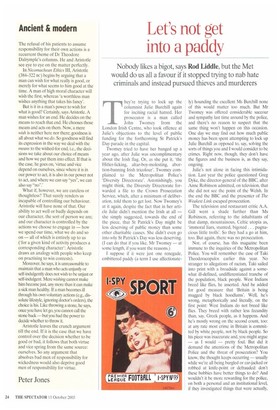Ancient & modern
The refusal of his patients to assume responsibility for their own actions is a recurrent theme of Dr Theodore Dalrymple's columns. He and Aristotle see eye to eye on the matter perfectly.
In Nicomachean Ethics III, Aristotle (384-322 BC) begins by arguing that a man can wish for what really is good, or merely for what seems to him good at the time. A man of high moral character will wish the first, whereas 'a worthless man wishes anything that takes his fancy'.
But is it in a man's power to wish for what is good? Certainly, says Aristotle. A man wishes for an end. He decides on the means to reach that end. He chooses those means and acts on them. Now, a mere wish is neither here nor there; goodness is all about what we do. So goodness will find its expression in the way we deal with the means to the wished-for end, i.e., the decisions we take about our choice of means and how we put them into effect. If that is the case, he goes on, 'virtue and vice depend on ourselves, since where it is in our power to act, it is also in our power not to act, and where we can say "yes", we can also say "no".'
What if, however, we are careless or thoughtless? That surely renders us incapable of controlling our behaviour. Aristotle will have none of that. Our ability to act well or badly depends on our character, the sort of person we are; and our character is controlled by the actions we choose to engage in — how we spend our time, what we do and so on — all of which is entirely up to us ('for a given kind of activity produces a corresponding character': Aristotle draws an analogy with people who keep on practising to win contests).
Moreover, he says, it is unreasonable to maintain that a man who acts unjustly or self-indulgently does not wish to be unjust or self-indulgent. Mere wishing cannot make him become just, any more than it can make a sick man healthy. If a man becomes ill through his own voluntary actions (e.g., dissolute lifestyle, ignoring doctor's orders), the choice is his. Like throwing a stone, he says, once you have let go, you cannot call the stone back—but you had the power to decide whether to throw it.
Aristotle leaves the crunch argument till the end. If it is the case that we have control over the decision whether to be good or bad, it follows that both virtue and vice spring from the same source: ourselves. So any argument that absolves bad men of responsibility for wickedness would also deprive good men of responsibility for virtue.
Peter Jones


















































































 Previous page
Previous page